John Janaro's Blog, page 269
October 20, 2014
All I Can Do is Offer

O God, I give thanks to You. How amazing is the design of Your wisdom for the human race. You have willed to manifest and glorify the Mystery of who You are by pouring Yourself out and becoming one of us. You dwell among us and give Yourself up entirely for each and all of us.
You reveal that the Absolute Being is Absolute Love, and You offer that Love to each of us. In your wisdom you shape the hearts of each of us, fashioning us to be Your companions, making us capable of giving and receiving love and then placing Yourself in the midst of us so that we might love You and be loved by You and be transformed into Your likeness.
O Jesus help me.
All I can do is offer everything to You.
You have created me for Yourself.
My heart desires You,
and yet how often do I even think of what I do?
I am resolved to do the best I can.
I am resolved to seek Your will and to do Your will,
because Your will is Love,
and it will always be what will enlarge my soul,
and make me truly free,
because I am made for Love.
So I offer myself to You;
I abandon myself completely to You,
and to Your plan for my life.
I know there is weakness and resistance in me
that I do not know how to overcome.
I know there are ways I must grow that I do not understand.
I know that my life is a mystery hidden in Your wisdom and goodness.
O Jesus, I offer everything to You.
Convert me.
Change me.
Open my heart to the love You give me in this moment.
Carry my soul.
Give me, in Your Infinite Mercy, the willing heart
that loves You in the way You long for me to love You.
I am hindered from the freedom for which I have been made,
the freedom to live as the image and grow as the likeness of God.
And so I abandon myself entirely to Your Mercy.
For You have loved me first,
so that--by the power of Your love--I might love You
and receive You in giving myself to You.
Jesus I trust in You.
Jesus I trust in You, completely.
Published on October 20, 2014 19:23
October 19, 2014
Blessed Paul VI: The Joy of Christ
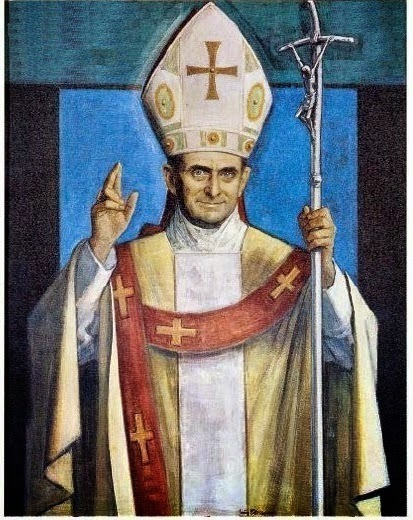
"May the world of our time,
which is searching,
sometimes with anguish,
sometimes with hope,
be enabled to receive the Good News
not from evangelizers who are dejected, discouraged, impatient or anxious,
but from ministers of the Gospel
whose lives glow with fervor,
who have first received the joy of Christ,
and who are willing to risk their lives
so that the kingdom may be proclaimed
and the Church established
in the midst of the world."
~Blessed Paul VI, Evangelii Nuntiandi, 80
Published on October 19, 2014 19:26
October 18, 2014
Finding Mercy in Jesus
 Mercy has been a topic of much discussion recently.
Mercy has been a topic of much discussion recently.Sometimes it seems like we're trying to put "mercy" in a box and dole it out according to our own measure. This is an effort that cannot succeed, and it's just as well because our measure is so meager.
The mercy of other people is at best a sign and an instrument of the ineffable, overflowing mercy of God.
I trust in His mercy, because He knows me. In His mercy He knows the undying thirst of my soul; He knows my heart's longing in a way that I don't even begin to understand. I trust in Him to lead me to my destiny.
I trust in His mercy to give me what I need (because I don't know what I need -- I don't really know my true self). I trust in His mercy also to break off from me the things that keep me from attaining the real fulfillment for which I have been made, which is nothing else but Him.
I trust His tenderness and His gentleness, which endure even when all other affirmations or consolations are absent and I feel abandoned and alone. In this solitude I can only cry out to Him and long for Him in the firm conviction that He hears me, He wants me, and that the darkness and emptiness are the vast spaces of the mystery of His inexhaustible Heart that holds me.
He knows who I am, and He carries me in my suffering and accompanies me through all its depths. He has made those depths His own. His mercy is His brokenness on the Cross which He invites me to share.
The best way we can show mercy to one another is to help bear one another's burdens, to open our hearts to the mystery of the other person's suffering. This is what we need from one another. It is the way that we can discover the presence of Jesus in every person's life, not with condescension but with a great reverence for the person.
I must welcome this person, because this person is loved by Jesus. It is the great heart of Jesus that gives value and dignity to every person and to all our relationships. Whenever I speak to a person, my words should be shaped by the desire that Jesus come more fully to us both -- to heal us in His mercy and draw us together along the paths of His mercy.
As Pope Francis says, "We cannot trust in our own strength, but only in Jesus and in His mercy." Indeed, our strength is much too small to fathom the mercy of God. Our strength is too frail to bear His weakness on the cross.
Jesus, teach me to be merciful.
Have mercy on me.
Make me an instrument of Your mercy.
Jesus, I trust in You.
Published on October 18, 2014 15:17
October 17, 2014
Don't Miss a Great Conversion Story This Month!
All Magnificat subscribers take note: There is a "Great" Conversion Story (really) between the prayers for Friday and Saturday (see pp. 263-264). I am greatly devoted to the lives and the work of Jacques and Raissa Maritain, and the story of their conversion over a hundred years ago remains moving and compelling today.
Of course, if you are not a subscriber to this wonderful journal, click HERE to find out more about it.
For the time being, I'll give you a break and just reproduce the pages of article below. I hope you are edified by this brief introduction (or review) of these dramatic events.
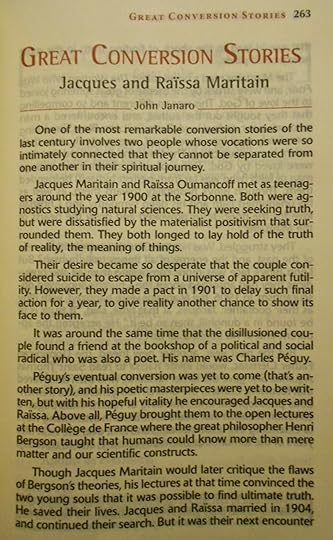
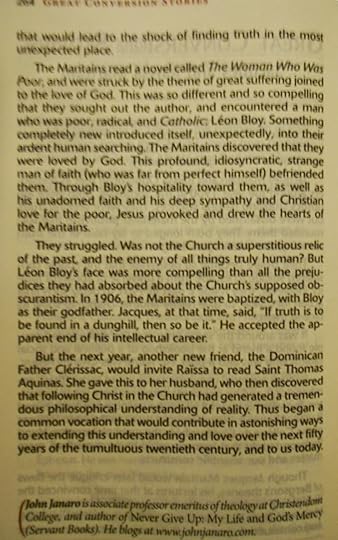
Of course, if you are not a subscriber to this wonderful journal, click HERE to find out more about it.
For the time being, I'll give you a break and just reproduce the pages of article below. I hope you are edified by this brief introduction (or review) of these dramatic events.


Published on October 17, 2014 20:00
October 15, 2014
More Than a Silver Lining
 It's difficult to see things through the window in weather like this!
It's difficult to see things through the window in weather like this!Rain, rain, rain.
My old bones don't like it much. But their complaints seem small as I look through the window and try to make out what's happening in the fog and the squall.
There are floods, and they are getting worse. And not just floods of rainwater in the Valley.
These are some hard days. The news is hard. Clouds keep gathering on so many fronts. What is happening in our poor world?
Perhaps we are going to learn in a more immediate way how much we all really do depend on one another.
The "human family" is not a cozy, tame little idea. If someone hurts, we all hurt. We can't escape this fundamental fact, no matter what happens in the crises that have gained our attention. Even if the immediate circumstances are resolved on all fronts, the human family already shares a profound bond of suffering. We all share a common affliction.

We also share a common hope.
We share a source of unity that is greater than everything that divides us -- greater than every fear.
I pray that I might remember this fact, and that it will change my mentality and transform my way of looking at the world and all of the problems and the dangers, and all the evil that has already been judged and vanquished.
Published on October 15, 2014 17:38
October 13, 2014
The Heart Does Not Die
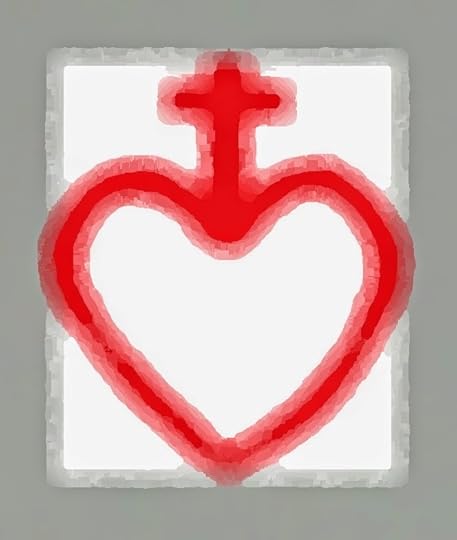 People can ignore their hearts, or try to satisfy them in ways that don't work.
People can ignore their hearts, or try to satisfy them in ways that don't work.They can pretend to have achieved happiness on their own (inevitably narrow) terms, or they can try to cloud their perspective with apathy, narcissist self-indulgence, or cynical resignation.
Still, the heart does not die.
It wakes up again, sooner or later, and wells up with longing and with that insatiable thirst that dries up every illusion.
The One who sustains you every moment in your life is drawing your heart.
Published on October 13, 2014 19:00
October 7, 2014
Remembering Words of Truth: An Unusual Rosary Story
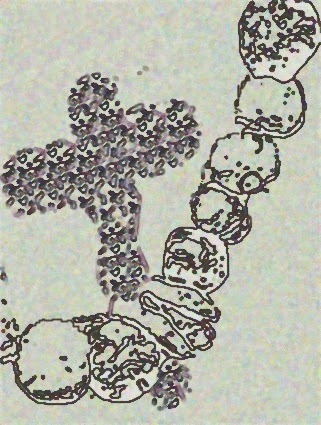 In yesterday's post, I wrote about Mary's love, the little things of daily life, and the small beads of the rosary. If we learn from Mary's heart, and if we persevere in staying with those little beads — even in the darkest and most difficult times — we can be confident that Mary will work in our lives and in the world, helping God to overthrow the oppressors and lift up the lowly.
In yesterday's post, I wrote about Mary's love, the little things of daily life, and the small beads of the rosary. If we learn from Mary's heart, and if we persevere in staying with those little beads — even in the darkest and most difficult times — we can be confident that Mary will work in our lives and in the world, helping God to overthrow the oppressors and lift up the lowly.Mary's works often begin with silence and grow over time. And her love works itself deep into the earth, into circumstances.
It's often surprising to discover Mary's gentle hand and heart at work in unlikely places, through very humble people and their fidelity to those little beads.
I want to illustrate with the story of a prisoner in a deadly labor camp during a time when a violent ideology and a violent dictator sent millions of innocent people to their deaths.
This prisoner was an atheist. He had conceived the desperate hope that, if he survived, he would convey to the world the horror and the destruction of human dignity that took place behind the barbed wire. He wanted to remember the experience and give a testimony. But of course these prisoners — barely living, on the verge of becoming corpses — were lucky to get bread; they certainly didn't have paper to write things down.
Perhaps he could "write things down" in his memory, and learn the words by heart. But how?
The atheist prisoner encountered something unusual in the prison camp. It sowed a seed in him. Here is what he said:
"I saw Catholics... busy making themselves rosaries for prison use. They made them by soaking bread, kneading beads from it, coloring them (black ones with burnt rubber, white ones with tooth powder, red ones with red germicide), stringing them while still moist on several strands of thread twisted together and thoroughly soaped, and letting them dry on the window ledge.
I joined them and said that I, too, wanted to say my prayers with a rosary but that in my particular religion I needed one hundred beads in a ring... [and] with true brotherly love [they] helped me to put together a rosary such as I had described, making the hundredth bead in the form of a dark red heart.
I never afterward parted with this marvelous present of theirs; I fingered and counted my beads inside my wide mittens—at work line-up, on the march to and from work, at all waiting times; I could do it standing up, and freezing cold was no hindrance.
I carried it safely through the search points, in the padding of my mittens, where it could not be felt. The warders found it on various occasions, but supposed that it was for praying and let me keep it. Until the end of my sentence (by which time I had accumulated 12,000 lines) and after that in my place of banishment, this necklace helped me to write and remember."Thus, this atheist prisoner said "his rosary," and remembered — bead by bead — what he saw and heard and felt. He remembered the misery, but also the beauty that he discovered, the beauty of the transcendence of the human person. The most monstrous forces of power in this world could not erase this transcendence.
Catholic prisoners who had committed no crime, who had been rounded up like cattle along with many others and thrown into the jaws of death, were faithful to the rosary. They made coarse beads of dried bread for Mary, which meant — of course — a little less bread for themselves.
Then a stranger came and asked for help, and they responded "with true brotherly love." And what was it that moved them to the effort to make that hundredth bead "in the form of a dark red heart"?
Perhaps it was because they loved him.
Surely, Mary loved him.
The atheist survived, and eventually wrote his 12,000 lines and thousands of pages more.
He also found God.
And he wrote the most monumental prison memoir of all time. Above all, he tore the mask off the face of Communism and revealed all its ugliness, but also its ultimate powerlessness. Years later he said, "One word of truth outweighs the whole world." Alexander Solzhenitsyn spoke and wrote many, many words of truth. And the world of lies that was the Soviet Union shook under the weight of The Gulag Archipelago and heard the first rumblings of its own destruction.
The Lord "has cast down the mighty from their thrones, and has lifted up the lowly" (Luke 1:52).
Solzhenitsyn, the former Marxist and atheist, eventually became an Eastern Orthodox Christian, which means that he learned to sing the Akathist and all the beautiful liturgical hymns honoring the Theotokos, Mary. He learned to pray the Byzantine "liturgical rosary" of litanies with its continual turning of the heart to the Mother of God.
Still, he probably never learned exactly how those Lithuanian Catholics in the Gulag used their precious bread beads. He may never have realized that the love learned on those beads led to the simple gesture of a gift with a dark red heart — a gift that helped him to survive and to hope and "to write and remember."
He did not know that Mary was his companion in those dark days of the Gulag. But it was Mary who heard the prayers of his comrades and sowed the seeds of truth in him.
This is only one of the countless little ways that Mary accomplishes her victory. She continues to work wisely and gently, working out the triumph of her mother's heart by leading her children to healing, renewal, and joy.
Published on October 07, 2014 21:09
Sowing the Seeds of Mary's Victory
 The Pilgrim Virgin of Fatima, as guest
The Pilgrim Virgin of Fatima, as guestin our house in January of 2012.Today is the feast of Our Lady of the Rosary, and it is a wonderful occasion for celebrating this Gospel-centered prayer of simple gestures with beads and meditation with the mind and heart. It is an invitation to enter into Mary's school of prayer; to let her teach us how she accompanied Jesus through His life, death, and resurrection, and how she "treasured all these things in her heart" (Luke 2:51).
This day is marked in history by the successful defense of Christian Europe against the invading Turks in the Battle of Lepanto in 1571. Pope St. Pius V had asked everyone to pray the rosary for the success of this seemingly desperate enterprise that sought to prevent the ruthless invasion of Western Europe, and thereafter the rosary acquired a special relationship to Mary's maternal protection against the perpetrators of violence and oppression. She was given the title of "Our Lady of Victory."
At Fatima in 1917, the Mother of God once again proposed praying the rosary as the way to prevail over the unprecedented flood of horror and dehumanization that had already begun in Europe and the world, and that would dominate the 20th century.
She spoke too about her heart — the heart that had treasured everything and pondered and carried the whole world with Jesus on the Cross, the heart that suffered and remembered — her all-holy, immaculate heart.
This is the way to victory: the rosary and Mary's heart.
When we pray the rosary today, we may wonder what sort of "victory" we can hope for. The world is in turmoil, and Jesus and Mary are hard to find in our society, in the chaos that surrounds us and — let's be honest — swirls around inside of us, preoccupies us, makes us so often foolish, angry, afraid.
Have we been abandoned? Where is that maternal protection that we need so much? Mother Mary, have you left us alone?
No, she has not abandoned us!
She never gives up on any one of us, because she is our mother. She is with us even if we are sick with fever and cannot recognize her tenderness.
And she loves all her children. The world belongs to her, and she is hard at work for true peace. She is sowing miracles everywhere that will bear fruit in patience — miracles that begin like tiny seeds, like the beads of the rosary.
Our fidelity to those beads is crucial, however distracted we may be, however frustrated we may feel about our efforts to "meditate" (or even to stay awake), as long as we have the heart for it. We want to share in Mary's heart of love, at least a little bit, and then a little bit more, one bead at a time.
Our fidelity to those beads helps us to live the "beads of life," the smallness of love from one moment to the next. We take one bead with hope, and then the next bead... again, with hope.
That is how Love triumphs in the world.
Published on October 07, 2014 16:31
October 6, 2014
How to Keep from Losing Heart and Giving Up

When I woke up this morning, I felt ready for the day – ready to accomplish all sorts of things. After one fix-it project, however, I was pooped and hurting. Back to bed.
I'm still having a tough time of it. And I wonder if I am losing heart.
It's in moments like these that Jesus asks me, “Do you believe in Me? Do you trust in Me? Do you love Me?”
I know that here my own particular wacky circumstances intersect with the drama of every person’s life. We all have this place where we suffer, where we face our own inadequacy, where we discover the smallness of our hearts and the pettiness of all our deeds.
And it is here that Jesus asks each one of us, in the most penetrating and poignant way, to believe in Him, to trust Him.
I do believe that He loves me, whatever darkness may surround me.
Why do I fail to entrust everything to this Great Lover? Why am I afraid? What more could He possibly do to deserve my trust?
Jesus, I entrust to You what seems so often to me to be such a complicated business, namely the abandonment of myself to You, the giving of everything over to You, the surrender of everything to You...even my weakness.
Jesus, I entrust "my-entrusting-of-myself-to-You" TO YOU!That's an awkward way of putting it. But I'm sure He knows what I mean.
I will not give up. Even if I am broken, God is still God, and still Glorious – even more clearly so, for He shares in my brokenness. Here, more than anywhere, it is clear that He is worthy of all my love. He has proven Himself. Thus, in every circumstance – even in the face of the prospect that I have nothing to give, that I am worthless, that all my aspirations in life may end in failure – the only reasonable possibility for me is to love God.
So even if I am nothing, I still want to love Him. I beg that I might be able to love Him.
From nothing, God creates, God brings forth life. Jesus I trust in You. Convert me. Conquer me. Recreate me in Your merciful love. Give me a new heart.
Published on October 06, 2014 16:15
October 4, 2014
The Human Vitality of St. Francis
 The feast day of the incomparable Saint Francis of Assisi brought beautiful Autumn weather with it this year.
The feast day of the incomparable Saint Francis of Assisi brought beautiful Autumn weather with it this year.We have a cheap statue of St. Francis on the front porch, and I took some pictures and then fooled about with my Paint program to see what I could make of it.
Not much, as you see.
When it comes to the real St. Francis, there is a lot more material to work with. I wrote about his conversion story last month, but I won't give away my telling of that story yet: you'll have to wait for the column to appear next year in Magnificat (May 2015, I think).
Instead, I'll look backwards to the words I wrote 24 years ago, on October 4, 1990. The point that Young Janaro made here remains valid, I think. Francis was never a wicked man; on the contrary it was the human vitality of the young troubadour and would-be-knight that shows forth all the more the power of grace to transfigure human nature.
The extraordinary sanctity of Francis only intensifies all of the good and generous qualities of his human personality.
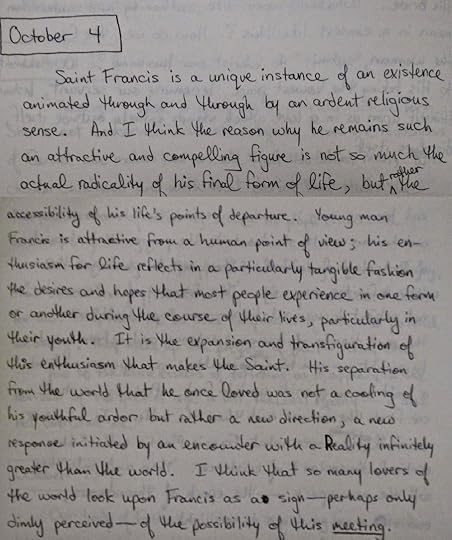
Published on October 04, 2014 20:08



